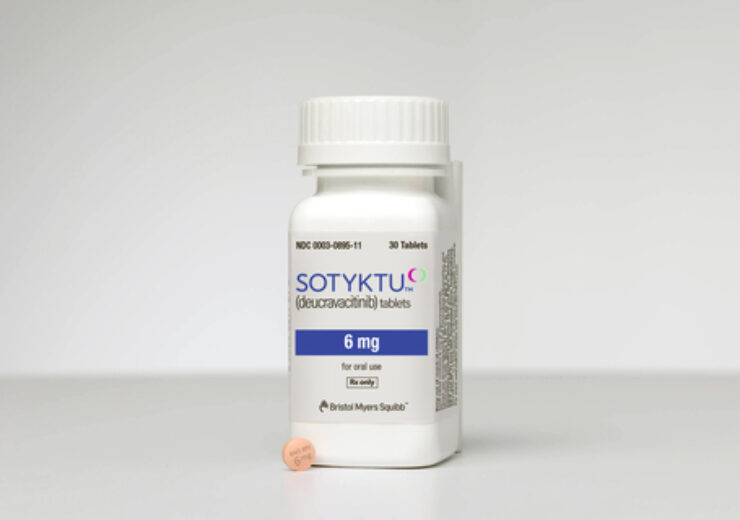Approval of Sotyktu was driven by the findings of the phase 3 POETYK PSO-1 and POETYK PSO-2 clinical trials in which once-daily orally administered dosage of the drug candidate showed superior efficacy compared to placebo and twice-daily Otezla

Product image of Sotyktu. (Credit: Bristol Myers Squibb)
Bristol Myers Squibb (BMS) has secured approval for Sotyktu (deucravacitinib) from the US Food and Drug Administration (FDA) for the treatment of moderate-to-severe plaque psoriasis in adults.
The approval is for the drug to be used in patients who are candidates for systemic therapy or phototherapy.
Bristol Myers Squibb’s oral, selective, allosteric inhibitor of tyrosine kinase 2 (TYK2) was approved by the FDA based on the findings of the phase 3 POETYK PSO-1 and POETYK PSO-2 clinical trials.
The two trials showed superior efficacy of Sotyktu administered once-daily compared to placebo and twice-daily Otezla (apremilast). This was seen in 1,684 patients aged 18 years and over who have moderate-to-severe plaque psoriasis.
Sotyktu’s superior efficacy compared to placebo and Otezla was noted at 16 as well as 24 weeks, and responses with the Bristol Myers Squibb’s TYK2 inhibitor persisted through 52 weeks.
Bristol Myers Squibb chief medical officer Samit Hirawat said: “The approval of Sotyktu represents an exciting day for patients suffering from moderate-to-severe plaque psoriasis who are not satisfied with topical and conventional treatments.
“This is another extraordinary achievement for Bristol Myers Squibb, as we bring forward a new mechanism of action, the first oral treatment approved in nearly 10 years, and the first orally dosed once-daily treatment for moderate-to-severe plaque psoriasis.
“We believe Sotyktu is a breakthrough in the treatment of patients with this condition, and we’re excited about its potential in other immune-mediated diseases.”
Bristol Myers Squibb expects to make Sotyktu available to patients in the US this month.
The TYK2 inhibitor is being reviewed by the European Medical Association (EMA) and other health authorities globally for the treatment of moderate-to-severe plaque psoriasis.
In Japan, the Ministry of Health, Labour and Welfare is reviewing the drug for the treatment of moderate-to-severe plaque psoriasis, erythrodermic psoriasis, and pustular psoriasis in adults.
